#Maxime Bernier
Text

BRANDON, CANADA REPORTBACK:
All across the country an alliance of the religious-right and far right extremist groups is trying to invade school board meetings demanding the removal of any material supportive of LGBTQ+ youth.
These are the same bigots targeting educators and entertainers in drag who perform story time for kids, very popular events hosted by many public libraries.
One recent confrontation came in Brandon, Manitoba. There the public school board bowed to pressure from “concerned parents” to review their policy and examine library books. There was so much local interest that the meeting had to be held in a school gym.
The good news is that the community turnout was overwhelmingly supportive of LGBTQ+ kids. One trans student spoke to the importance of finding positive literature in the library as part of making school a safe place for them. Parents and teachers echoed the sentiment, citing the need for safe supportive environments to avert the tragically high rate of suicide among trans kids.
In the end the handful of bigots were drowned out and the evangelical former school trustee who pushed for the meeting didn’t even show up. The school board voted 6 – 1 to maintain its policy of inclusion.
The cherry on top was when People’s Party leader Maxime Bernier showed up to a loud chorus of boos and heckling. The PPC has opportunistically made anti-LGBTQ+ politics its main focus. Seeing things weren’t going his way, Bernier slunk out in mid-meeting.
#antifa#lgbtq+#maxime bernier#ppc#homophobia#transphobia#book banning#freedom#never let them have the school board meeting
119 notes
·
View notes
Text
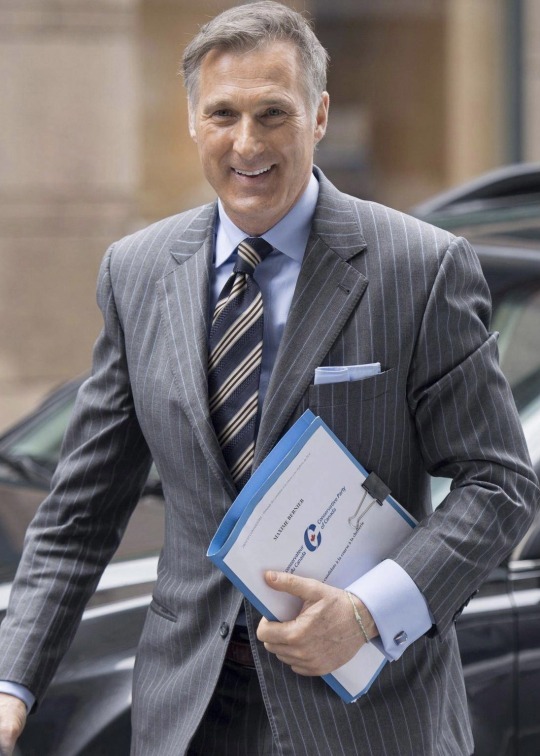
Maxime Bernier
#suitdaddy#suiteddaddy#suit and tie#suited daddy#daddy#men in suits#suited grandpa#suited men#suited man#suited and booted#suitedman#suit daddy#buisness suit#canadian men#Canadian man#Maxime Bernier#Suitfetish
114 notes
·
View notes
Text
Pierre Poilievre’s Conservatives are being accused of sending homophobic mailings attacking People’s Party leader Maxime Bernier to voter’s homes ahead of a federal byelection in Manitoba.
Bernier, who only narrowly lost the leadership of the Conservative Party in 2018, is seeking a seat in Parliament by running in Portage-Lisgar, a rural Manitoba riding recently vacated by former Conservative interim leader Candice Bergen.
Bernier, who now leads the far-right People’s Party, is up against Conservative candidate Branden Leslie, a longtime party staffer turned lobbyist — the campaign has devolved into both candidates accusing one another of being fake conservatives.
Now, the People’s Party is alleging Poilievre’s Conservatives are engaging in an 11th hour dirty tricks campaign by circulating photos of Bernier celebrating Pride. [...]
Continue Reading.
Note from the poster @el-shab-hussein: why are we still pretending this f*cker is still relevant and that platforming his views in journalism isn't just gonna spread his fascist beliefs and legitimize them?
Tagging: @politicsofcanada, @vague-humanoid
41 notes
·
View notes
Text
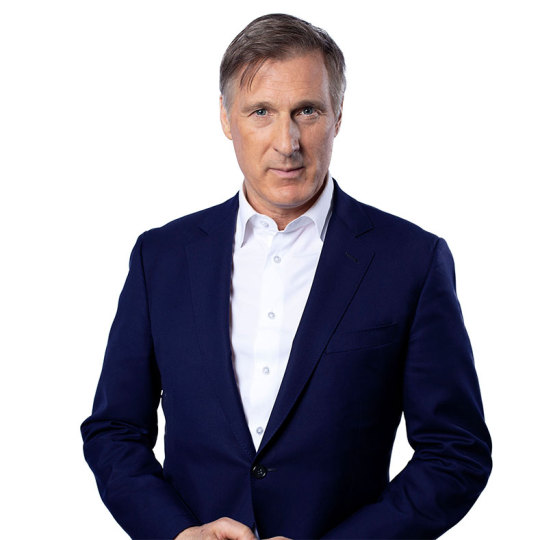
Mad Max😛
#mad max#Maxime Bernier#ppc#people's party of Canada#canada#canada first#politics#cadpoli#purple#strong and free#fort et libre#populist
2 notes
·
View notes
Link
Canada on the brink
#Canada#constitutional rights#accountability#lawlessness#lawsuit#injustice#Maxime Bernier#PPC#democracy#federal court#institutional capture#WEF
0 notes
Text
Canada’s answer to Roderick Spode came to my town of Saint John, New Brunswick today, confused it with Halifax, Nova Scotia, and reminded everyone that his candidate in the last election was the semen retention guy.

(In the first photo, he is literally facing a giant sign that says “Saint John.”)
1 note
·
View note
Text
vote on whether i should publish my political satire re. the 2019 canadian election
#canpoli#onpoli#politics#satire#i'm wheezing yall i can't believe i actually wrote that#a teaser: pp leader maxime bernier who lost in beauce and is not the same maxime bernier as the maxime bernier who lost in beauce
2 notes
·
View notes
Text
Analysis: Is Canada Really So Immigrant-Friendly?
Trudeau’s ambitious plan to increase immigration is facing pushback from the left and right.
— By Claire Porter Robbins | Foreign Policy | August 28, 2023
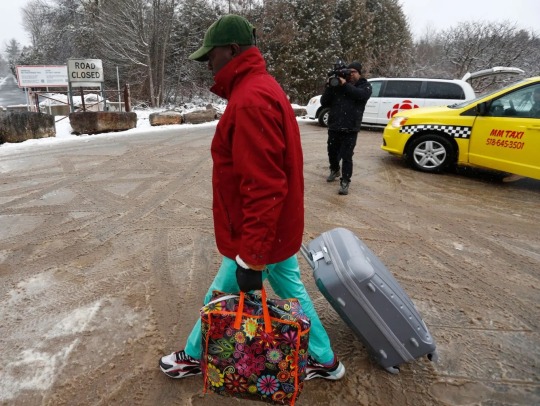
A refugee arrives at the Roxham Road border crossing at the U.S.-Canada border in Champlain, New York, on March 25, 2023. Lars Hagberg/AFP Via Getty Images
Canadians like to think of their country as a nation built on immigration. Canada, the story goes, is a bastion of multiculturalism. This narrative has been refined through smug comparison to the United States and other Western countries. At first glance, it may seem that Canada is more welcoming: While other Western nations have faced heavy criticism for their migration policies, Canada has garnered a reputation as being immigrant-friendly. Since 2019, the Canadian government has resettled more refugees than any other country, with little public backlash.
So in November, when Prime Minister Justin Trudeau announced a plan to expand immigration, it seemed like a politically savvy move. Since Trudeau took office in 2015, immigration has already increased from around 300,000 to 400,000 new residents per year. Now, Canada plans to welcome 500,000 permanent residents each year by 2025. Laid out as a way to build up the Canadian economy, which faces labor shortages and a declining birth rate, the plan prioritizes bringing in skilled immigrants. It was met with praise from major corporate advocacy groups, such as the Business Council of Canada.
Ten months later, Trudeau’s plan is facing skepticism from both sides of the political spectrum. Criticism from the far right is no surprise. But as the government has struggled to integrate and support migrants, the prospect of bringing in significantly more of them has led immigration experts and advocates to air grievances about what they see as the administration’s failings in related sectors, notably refugee resettlement and housing.
Meanwhile, public opinion on immigration has started to shift. As cost of living and housing prices stay stubbornly high, anti-immigration sentiment—long boiling—may rise to the surface.
In early 2019, controversy arose over billboards put up across the country with the slogan “Say No to Mass Immigration,” which promoted then-MP Maxime Bernier’s far-right People’s Party of Canada in the campaign for the upcoming federal election. Complaints and citizens’ petitions ultimately led the advertising company to take down the signs.
Those who complained about the billboards, including candidates from Canada’s center and left-wing parties, saw their removal as a victory for Canadian pluralism, thrown into relief by then-U.S. President Donald Trump’s xenophobic, anti-migrant policies to the south. On election day in 2019, Trudeau’s Liberal Party triumphed, while Bernier’s party received meager support.
The Liberals’ success, combined with the outcry over the far right’s weaponization of immigration, signaled to Trudeau that most Canadian voters were resolutely pro-migration. Polling seemed to back this up. The month before the election, the Environics Institute for Survey Research found that 85 percent of Canadians surveyed agreed that immigration has a positive effect on the economy, while 69 percent supported the current immigration rate.
Yet these figures obscured Canada’s long-standing challenges with diversity and inclusion. “Because Canada is pro-immigration, there’s a perception that conflates this with Canada being an open society and not being racist,” said Pallavi Banerjee, a sociologist at the University of Calgary who researches how discrimination affects young migrants’ futures.
Canada has a history of racist policies related to immigration, from the late-19th-century Chinese head tax, which forced Chinese immigrants to pay a fee when entering the country, to Quebec’s highly controversial Bill 21, a law passed in 2019 that prohibits the display of religious symbols from public servants’ attire, including crosses, turbans, kippahs, and hijabs. In one high-profile incident in 2021, Bill 21 led to the removal of a Muslim teacher from her classroom for wearing a hijab.
In a 2022 Environics survey, 46 percent of respondents agreed that “there are too many immigrants coming into this country who are not adopting Canadian values.” The term “Canadian values,” though vague, points to respondents’ desire for immigrants to assimilate. The same poll has been conducted for three decades, and while that figure has decreased from 72 percent in 1993, it still indicates that Canada has yet to fully embrace multiculturalism.
Even at current immigration levels, Banerjee said, migrants are segregated from established Canadians, limiting opportunities for them to integrate into the social fabric of their new country and thrive. According to Statistics Canada as of 2021, 41.8 percent of nonpermanent residents and 16.1 percent of immigrants who moved to Canada in the past five years lived in poverty.
The government’s failure to fully integrate newcomers has spurred skepticism of Trudeau’s new program on the left. Columnists for center and left-wing outlets have written that Canada has an “immigration elephant in the room,” referring to racism against newcomers, and that the country is “woefully unprepared for the coming immigration boom” due to funding cuts for newcomer settlement organizations, which are typically funded through a combination of federal, provincial, and private donor funds.
Advocates for refugees and other migrants are some of the loudest voices demanding reform to Canada’s immigration and settlement processes before expansion. Directors of settlement and refugee organizations, who may have otherwise endorsed Trudeau’s plans, say the system is already overloaded. Newcomers categorized as “highly skilled” have publicly complained about being stuck in a bureaucratic limbo with the immigration ministry and not receiving decisions on their residency permits for years.
Public opinion appears to have shifted as well. Even before Trudeau’s plan, anti-immigration sentiment was already worsening online due to the COVID-19 pandemic, Banerjee said, as some Canadians blamed immigrants, particularly those of Asian descent, for the spread of the disease. In July, David Coletto, CEO of Canada’s Abacus polling firm, wrote on his Substack that 61 percent of Canadians polled believe that 500,000 immigrants per year is too high, including 37 percent who feel it is “way too high.” In addition, a July Abacus survey found that four in 10 Canadians polled would vote for a politician who promised to reduce immigration levels.
Now, some Canadians are conflating a different issue with immigration: the housing crisis that Trudeau has been unable to stem in his nearly eight-year tenure. In the many think pieces about immigration, commentators have complained of already overburdened services, from health care wait times to the availability of language lessons. But the most common criticism of Trudeau’s plan to expand immigration is the lack of affordable housing.
“Canada doesn’t have a refugee problem. Canada has a housing problem,” said Francesca Allodi-Ross, who runs Romero House, a nongovernmental organization in Toronto that connects migrants with people who have spare rooms. She worries about newcomers being blamed for a housing shortage that has been a long time coming.
According to the Organization for Economic Cooperation and Development, Canada has the most expensive housing market in the G-7. Vacancy rates for rental housing are at a two-decade low, and the Royal Bank of Canada expects the country’s rental housing gap (the difference between available rental units and those seeking them) to surpass 120,000 by 2026—quadrupling today’s deficit. In early August, Stefane Marion, the chief economist of the National Bank, called on the government to revise the immigration target until housing supply could match demand, citing “record imbalance” between the two.
Meanwhile, as housing shortages threaten to affect the coming “highly skilled” migrants prioritized by Trudeau’s plan, social justice-oriented groups such as Romero House have pointed out that the government has so far neglected to provide enough housing for other newcomers who have already arrived: specifically, refugees and asylum-seekers. The government’s failure to arrange temporary housing for them was glaringly apparent over the summer, when hundreds of asylum-seekers camped outside Toronto’s emergency shelter intake center.
The way the government responds to the needs of newcomers, and especially refugees, is “very reactive—and it’s been this way for years,” Allodi-Ross said. It was only after the Toronto shelter crisis, when many media commentators questioned Trudeau’s immigration expansion program, that the municipal, provincial, and federal government committed $71.4 million to housing for refugees and asylum-seekers, and the city freed up more hotels for emergency shelter.
Directors of temporary shelters and refugee settlement programs say there is a chronic lack of state funding and support for recent arrivals. John Mtshede, the executive director of Matthew House, a shelter for asylum-seekers in Ontario’s Niagara region, said his shelter is stretched to capacity. For years, the government has repeatedly denied Matthew House’s requests for funding to develop a plot of land for additional housing. Matthew House has found its most sustainable support through private fundraising and religious groups, rather than government funding.
Like many others who work at refugee and immigration NGOs, Mtshede is frustrated with the lack of coordination between the municipal, provincial, and federal governments about who bears responsibility for housing the government’s target of a little more than 70,000 new refugees each year. “Nobody wants to take the blame for this situation,” he said.
Despite the pushback, the Liberal government appears to be doubling down and ignoring accusations that it has not funded the services required to process and settle newcomers. At a press conference in early August, a reporter asked Marc Miller, the new immigration minister, if the government would reduce the immigration targets.
“Whether we revise them upwards or not is something that I have to look at,” he said. “But certainly, I don’t think we’re in any position of wanting to lower them by any stretch of the imagination.” In the meantime, newcomers will increasingly become the fall guy for the housing crisis that has unfolded under Trudeau’s watch.
— Claire Porter Robbins is a Journalist in Calgary, Alberta, and the Founder of Btchcoin News. She has worked as an aid worker in the Middle East and in Strategic Communications for a United Nations Peacekeeping Mission.
#Canada 🇨🇦 | Economics | Migration & Immigration | North America 🇺🇸#Analysis#Immigrant-Friendly?#Prime Minister | Justin Trudeau#United States 🇺🇸#Refugees#Public Backlash#Claire Porter Robbins#Foreign Policy#Say No to Mass Immigration#MP Maxime Bernier#Far-Right | People’s Party of Canada#U.S. President Donald Trump | Xenophobic | Anti-Migrant Policies#Pallavi Banerjee | Sociologist | University of Calgary#Muslim Teacher | Hijab#Canadian Values#Multiculturalism#Racism#Newcomers#COVID-19#David Coletto | CEO#Abacus Polling Firm#Francesca Allodi-Ross#Organization For Economic Cooperation & Development#G7 | Royal Bank of Canada 🍁#Stefane Marion | Chief Economist | National Bank#Highly Skilled#Allodi-Ross#Matthew House 🏠#John Mtshede
0 notes
Text
https://nationalpost.com/news/no-joke-ottawa-to-give-ukraine-4-million-to-fund-gender-inclusive-demining
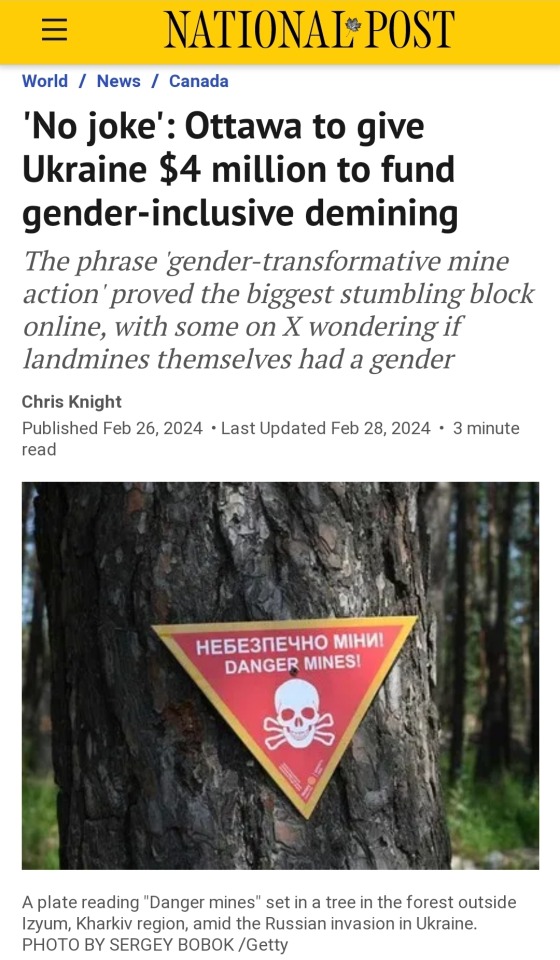
The press release that went out Saturday makes mention of $3.02 billion in financial and military support to Ukraine in 2024, but it also outlines a number of smaller, targeted initiatives.
One of these, listed as “Gender-inclusive demining for sustainable futures in Ukraine,” has a funding budget of $4 million.
“This project from the HALO Trust aims to safeguard the lives and livelihoods of Ukrainians, including women and internally displaced persons, by addressing the threat of explosive ordnance present across vast areas of the country,” the item reads.
“Project activities include conducting non-technical surveys and subsequent manual clearance in targeted communities; providing capacity building to key national stakeholders; and establishing a gender and diversity working group to promote gender-transformative mine action in Ukraine.”
The buzzword-laden final phrase caught many off-guard, and social media began filling up with queries and jokes about what it could mean.
People’s Party of Canada leader Maxime Bernier was perhaps the most straightforward when he tweeted a picture of the policy in question, adding: “No joke! YOU’RE ALL PAYING TO PROMOTE GENDER-INCLUSIVE DEMINING IN UKRAINE”
While the phrase “gender-transformative mine action” proved the biggest stumbling block, with some on X wondering if landmines themselves had a gender, the notion of gender-inclusive demining is actually quite simple.
As the website of The HALO Trust explains, “Clearing landmines inspires confidence by making land safe. It is also empowering for men and women alike. With training and a living wage, they can take control of their destiny.” The HALO Trust is a U.K.-based non-governmental organization dedicated to clearing landmines in conflict zones around the world.
Canada’s announcement does seem to be somewhat fixated on gender issues, with the word “gender” appearing seven times in the press release, including a mention of “gender responsiveness” in funding for resilient food systems; fighting gender disparity in Ukrainian media; and “gender-responsive” community priorities in reconstruction efforts.
Charlotte MacLeod, a spokesperson with Global Affairs Canada, told the Post that, thanks to HALO’s lobbying efforts, the Ukrainian Ministry of Defence in 2017 approved the employment of women as deminers, something that was previously banned by Ukrainian labour laws.
In a factsheet on the country, HALO notes: “Ukraine has seen the heaviest landmine and unexploded ordnance contamination in Europe since WW2, with an estimated 6.1 million people at risk.”
It estimates there are hundreds of thousands if not millions of actives mines in the country, and notes there have been more than 1,000 civilian casualties from mines there to date, and around 300 fatalities.
Because of social and economic roles, men and boys are more likely to be injured or killed by landmines. However, in some societies women and girls are expected to take on a caregiving role for survivors, or they may be taken out of school or married at an early age in response to the loss of a provider.
>men most likely to be killed and injured by landmines
>women most affected
62 notes
·
View notes
Text
news anchor voice MTV (martian tv) is back with more belated breaking news stories. today mark webber took back his statement for pride month—[grimy video footage of mark accepting seb’s post on instagram before opening whatsapp]—and posted a picture of his wife to his story, jumpscaring viewers everywhere who are more acclimated to the fact that he keeps her offline. the titanic wreckage millionaire tourist submersible continues to remain lost at sea, much like martian shippers around the globe. [pitched instrumental clip of dido’s white flag plays softly in the bg to avoid copystrikes]. once again maxime bernier proves himself to be a complete fucking joke, losing the byelection seat in manitoba. a close and anonymous source has described it as “clownery that aspires to be on the level of martianblr circa june 18, 2023.” finally, bitches get what bitches deserve, with widely known Piece Of Shit andrew tate and his brother tristan having been arrested in romania. all this and more at 5 on martian tv 📺
10 notes
·
View notes
Text
Canada wildfires spark 'ecoterrorist' conspiracy theory
June 8, 2023 - AFP
As Canada hurtles towards its worst wildfire season in history, a conspiracy theory has taken off online claiming environmentalists intentionally set some of the blazes.
"I bet a good portion of the wildfires raging across the country were started by green terrorists who want to give their climate change campaign a little boost," Maxime Bernier, a former foreign minister-turned fringe party leader, said in a June 5 tweet.
So far in 2023, Canada has seen larger wildfires than any previous year at this point in the season, with more than three million hectares burned. Tens of thousands of people have evacuated as a result.
On TikTok, a video already viewed almost 20,000 times, claims the fires in Nova Scotia were set "on purpose to push a climate change agenda."
One article speculates that since 90 percent of Alberta's fires could be "human-caused," there is a possibility that "ecoterrorists" may be behind them...
...some falsely theorize that the Canadian government is starting wildfires, either to advance its climate change policies or to force citizens into cities where it will be easier to impose "climate lockdowns."
Social media posts insist "arson not climate change" is responsible for the wildfires, but Natural Resources Canada told reporters June 5 that this fire season was exacerbated by hot, dry and windy conditions.
"Climate change is increasing the frequency and intensity of wildland fires and creating longer fire seasons," said Mike Norton, director general of the Canadian Forestry Centre.
People are waking up to the government sponsored arson.
#wildfires#fires#arson#prescribed burns#orgone#orgone energy#orgonite#orgonite gifting#geo-restoration#canada#canada wildfires#climate change
7 notes
·
View notes
Text
The leader of the People’s Party of Canada has been fined $2,000 for violating COVID-19 restrictions in Manitoba two years ago.
Maxime Bernier admitted to two charges of holding a public gathering contrary to public health orders that were in place in June 2021.
Two other charges of entering Manitoba without self-isolating were stayed under an agreement with the Crown attorney.
Bernier was arrested as he began a tour of Manitoba communities to prepare for the federal election that year and to denounce pandemic restrictions. [...]
Continue Reading.
Tagging: @politicsofcanada
42 notes
·
View notes
Video
youtube
DEI Policy Announcement
#voteppc
#dei#diversity equity and inclusion#race and politics#racism#discrimination#ppc#people's party of canada#policy#announcement#maxime bernier#patricia conlin#durham#canada first#voteppc
0 notes
Link
The crisis in Canada
0 notes
Text
Maxime Bernier invité à l'émission "Le monde à l'envers"
Merci d'avoir parlé de façon aussi juste !
8 notes
·
View notes
Photo
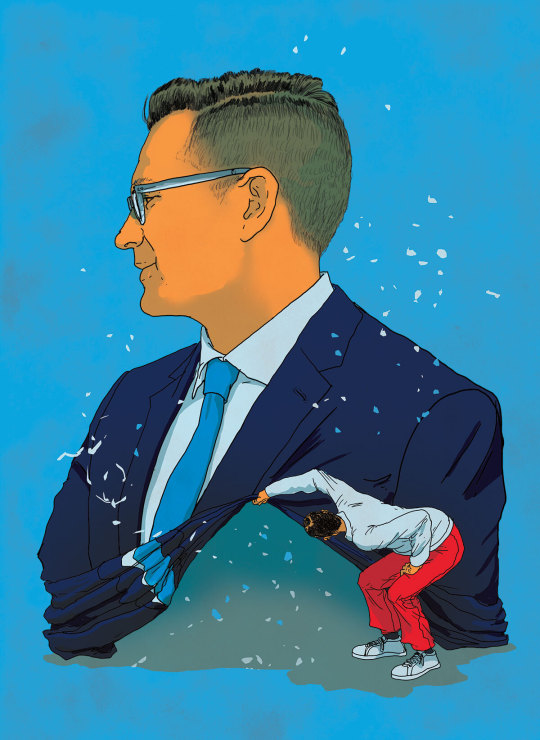
Pierre Poilievre: The Secret to His Success
How the Conservative leader is harnessing the growing tide of authoritarianism in Canada
Poilievre has been short on detailed policy positions but long on anger. It’s hard not to think that’s by design. Populist leaders offer an emotionally powerful message about the relationship between the “people,” whom the leader represents, and the “elite,” who stand in the way of the people getting what they want. But, beyond that, there is often no credible program for organizing society. This is why authoritarian populism is better understood as a recipe rather than a philosophy. It is a set of techniques for winning power, refined and honed by electoral entrepreneurs who observe what is happening in one jurisdiction, adjust for regional differences, and apply the lessons elsewhere. After several stillborn efforts in Canada—personified recently by Maxime Bernier and his People’s Party of Canada—Poilievre has cooked up something that appeals to the palates of a growing number of Canadians.
Read more at thewalrus.ca.
Illustration by Michael Byers (michaelcbyers.com)
#Politics#CanPoli#Pierre Poilievre#Populism#Authoritarianism#Conservatives#Conservative Party#Illustration#January/February 2023#Frank Graves#Stephen Maher#Michael Byers
7 notes
·
View notes